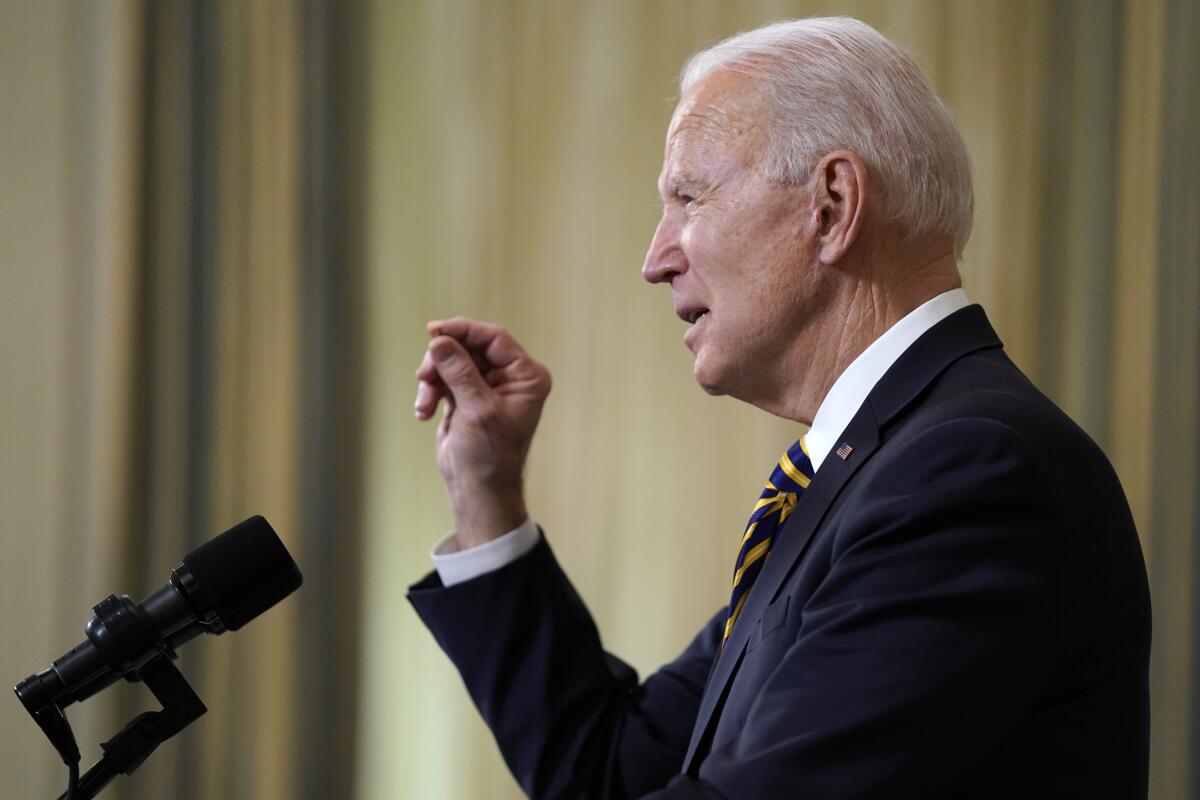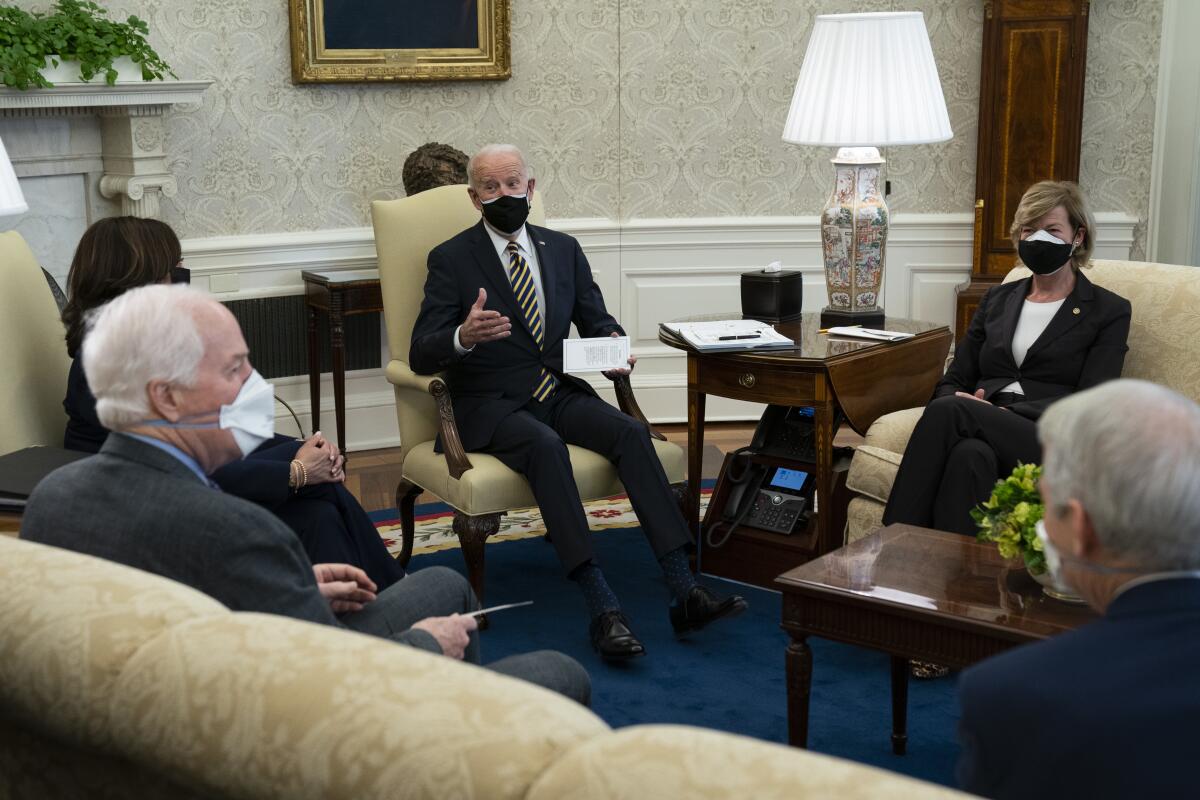With computer chips scarce, Biden orders supply chain review

WASHINGTON — President Biden announced Wednesday that his administration would review supply chains for key components in computers, electric cars, pharmaceuticals and military hardware, pledging to address a concerning dependence on unreliable foreign sources that was exposed when the pandemic upended the global economy.
Biden didn’t mention China by name, but his initiative could increase tensions between Washington and Beijing as they compete for international influence, should the United States take steps to be more economically independent and encourage allies to do so as well.
“We shouldn’t have to rely on a foreign country, especially one that doesn’t share our interests or our values, in order to protect and provide for our people during a national emergency,” Biden said as he signed an executive order launching the review.
Although supply chains have long been a topic of concern within businesses and think tanks, the issue exploded into public view last year when medical workers struggled to obtain enough masks and other protective gear to treat COVID-19 patients. More recently, automakers including General Motors and Ford have slowed production because they can’t obtain enough computer chips for new vehicles, which need the chips to power everything from engines to entertainment systems.
“These little chips here for automobiles, I didn’t realize how many billions of chips are in here,” Biden said during an Oval Office meeting with a bipartisan group of lawmakers before signing his executive order.
Taiwan manufactures the bulk of the world’s supply of semiconductors, which are a key component in computer chips. But Sen. John Cornyn (R-Texas), one of the lawmakers who met with Biden, said afterward that the U.S. needs to increase its production capabilities because China is moving rapidly to corner a larger share of the market.
“We all understand this is important, not only to our economy but to our national security, because these cutting edge, high-end semiconductors — they operate on everything from the F-35 fifth-generation stealth fighter to our cellphones,” Cornyn said.
Senate Majority Leader Charles E. Schumer (D-N.Y.) said this week that Senate committees would be drafting legislation to address the issue.
“Right now, semiconductor manufacturing is a dangerous weak spot in our economy and in our national security,” he said at a news conference. “That has to change.”

Biden’s executive order calls for a 100-day review of supply chains for semiconductors, rare earth minerals, large-capacity batteries and pharmaceutical ingredients. The batteries are particularly important for electric cars at a time when the president is pushing to get more of the zero-emission vehicles onto American roads and into the global marketplace to combat climate change.
Supply chains are enormously complex, and it remains to be seen what actions the Biden administration might take once the review is over.
“It’s very difficult. What you’re doing is changing the incentives and prices that affect thousands or millions of companies,” said Yukon Huang, a senior fellow at the Carnegie Endowment for International Peace.
Administration officials pitched the initiative as a way to create more jobs in the United States.
“Creating more resilient supply chains is an opportunity for our country to come together to create well-paying jobs for workers,” Sameera Fazili, deputy director of the White House National Economic Council, told reporters.
Biden will rally allies and set a new tone, yet underneath, his China policy may look closer to Trump’s than to Obama’s a decade ago.
Lobbyists for major industries, including healthcare, automotive and information technology, sent a letter to Biden this month calling for more federal funding and tax cuts as incentives to increase semiconductor manufacturing in the U.S.
“These initiatives will help grow the U.S. economy, increase jobs in advanced manufacturing, assure the supply of critical components essential to virtually all sectors of the economy, and strengthen our national security,” they wrote in a letter.
Barry Lynn, the executive director of the liberal Open Markets Institute, warned that it could be difficult to scale up manufacturing of semiconductors.
“It won’t get fixed overnight. This is one of the reasons it’s so dangerous,” he said. “It’s not like water in the tap. You can’t just turn a spigot.”
Supply chains are also a foreign policy puzzle. For example, China is the largest exporter of rare earth minerals, which are used to build consumer electronics, medical equipment and more.
One senior administration official, who requested anonymity to discuss the president’s executive order, said it’s possible the United States is “overly dependent on a single source” of rare earth minerals, and the White House would be “working with allies and partners to ensure we have diverse and resilient sources of supply.” Yet it’s unlikely that the United States would produce more at home, because the work is environmentally damaging.
Although Biden wants to temper relations with China after the combativeness of former President Trump’s approach, he said this month that he expects “extreme competition” between Washington and Beijing.
Dean Cheng, a senior research fellow at the conservative Heritage Foundation, said rejiggering the economic relationship between the United States and China could have ripple effects in other areas where Biden seeks cooperation, such as reducing global greenhouse gas emissions.
“If he intends to restrict Chinese access to the American market,” Cheng said, “he should expect the Chinese to tell John Kerry” — Biden’s top international envoy for climate change — “to fly his private jet into the Pacific Ocean.”
More to Read
Get the L.A. Times Politics newsletter
Deeply reported insights into legislation, politics and policy from Sacramento, Washington and beyond. In your inbox three times per week.
You may occasionally receive promotional content from the Los Angeles Times.











